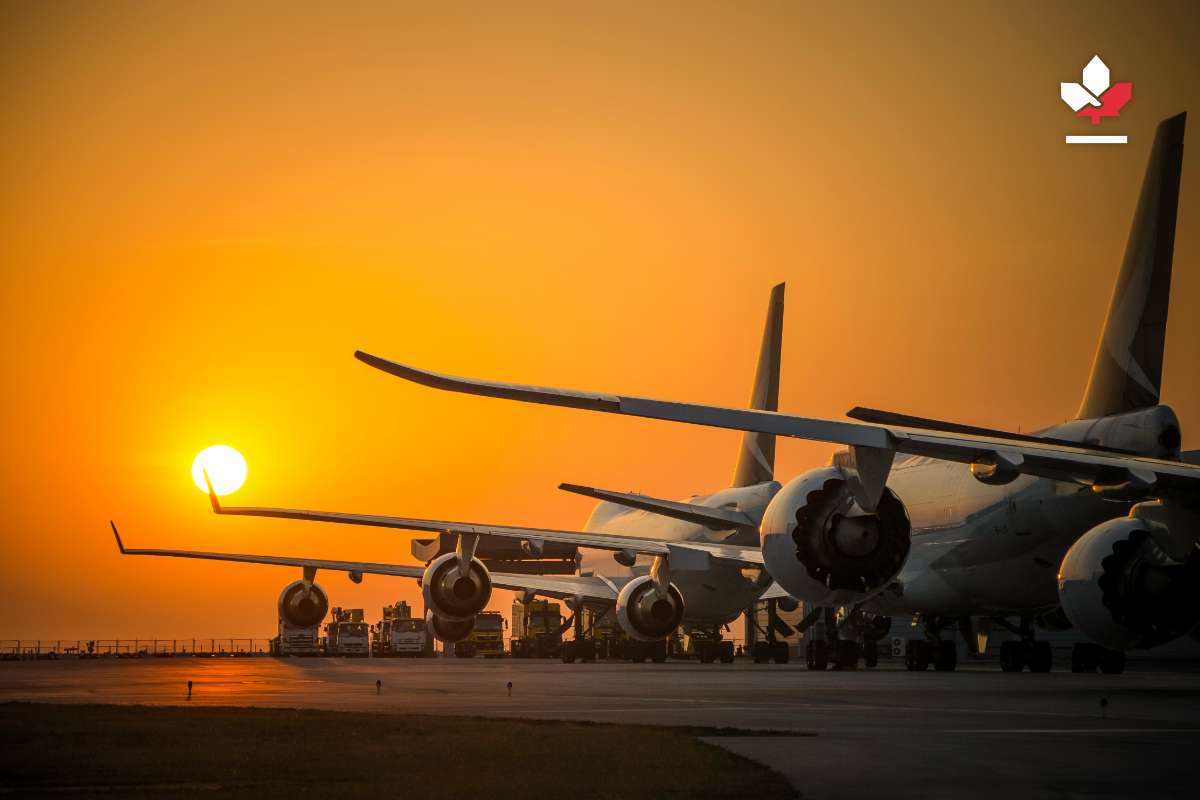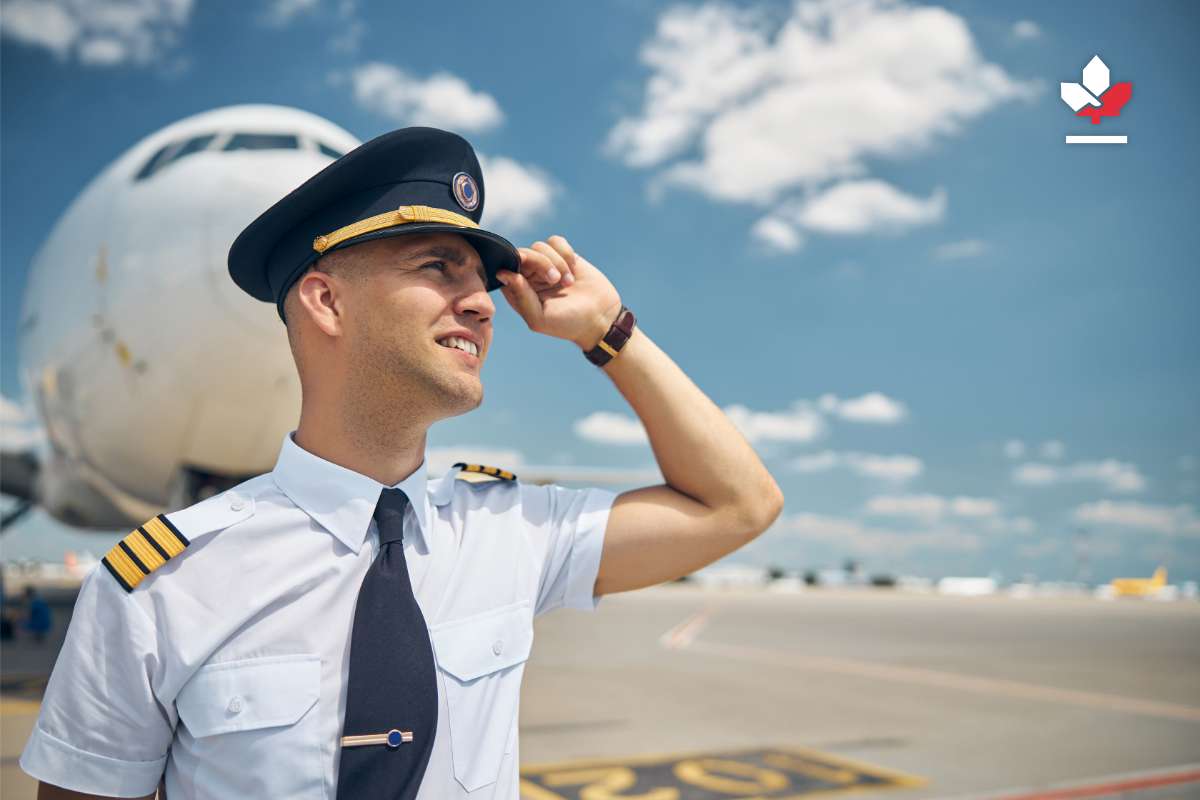Work in Canada's Aviation Industry
February 19, 2025
|
The aviation industry in Canada is thriving with diverse career opportunities. From pilots to maintenance engineers, the demand for skilled professionals grows. Canada's strong regulatory framework and advanced technology ensure high safety and operational standards. Aviation careers in the Great White North offer competitive salaries, job security, and opportunities for advancement. This presents exciting possibilities, whether starting your career or transitioning from another field.
Take a look below to explore the top career options and requirements for working in the aviation industry in Canada.
Does Canada Need Aviation Workers?

Canada's aviation industry is facing a growing demand for skilled workers. According to the Canadian Council for Aviation & Aerospace (CCAA), the sector is experiencing labor shortages, particularly in roles such as pilots, aircraft maintenance engineers (AMEs), and air traffic controllers. The increasing number of retirements and rising air travel demand have intensified the need for aviation professionals.
A report from Transport Canada indicates that the country could face a shortage of over 55,000 aviation workers. Airlines and aviation companies actively recruit and offer competitive salaries and training programs to attract new talent. Canada’s immigration policies support skilled foreign workers, making it an attractive destination for aviation professionals worldwide. As air travel recovers post-pandemic, the demand for qualified aviation workers will only continue to rise, making now an excellent time to enter the industry.
Top 10 In-demand Aviation Jobs in Canada

Canada's aviation industry is experiencing significant growth, creating a high demand for skilled professionals across various roles. Here’s an exploration of the top 10 in-demand aviation jobs in Canada, with National Occupational Classification (NOC) codes and annual average salaries from Canada’s Job Bank.
Commercial Pilot (NOC 72600)
Commercial pilots are at the forefront of the aviation industry, responsible for operating aircraft and ensuring the safe transportation of passengers and cargo. In Canada, the demand for commercial pilots is rising due to the increasing number of domestic and international flights and the retirement of experienced pilots. To become a commercial pilot, candidates must obtain a Commercial Pilot License (CPL) and accumulate flight hours. Air Canada, WestJet, and regional carriers actively recruit pilots to meet the growing demand. The annual average salary for commercial pilots in Canada is 149,064.16.
Aircraft Maintenance Engineer (NOC 21390)
Aircraft Maintenance Engineers (AME) are critical in ensuring aircraft airworthiness. They inspect, repair, and maintain aircraft systems and components. With the aging fleet of aircraft and the introduction of new, technologically advanced planes, the demand for AMEs in Canada is steadily increasing. Certification from Transport Canada is required, and specialized training in avionics or structures can enhance career prospects. The annual average salary for an Aircraft Maintenance Engineer in Canada is 105,190.88 CAD.
Air Traffic Controller (NOC 72601)
Air Traffic Controllers are essential for the safe and efficient aircraft movement in Canadian airspace. They manage takeoffs, landings, and flight paths to prevent collisions and minimize delays. This high-stress job requires excellent communication skills, quick decision-making abilities, and specialized training from NAV Canada, the country's air navigation service provider. The demand for air traffic controllers is expected to grow as air traffic increases and older controllers retire. The annual average salary for an Air Traffic Controller in Canada is 127,766.85 CAD.
Aerospace Engineer (NOC 21390)
Aerospace engineers design, develop, and test aircraft and spacecraft. This role is in high demand in Canada due to the country's strong aerospace manufacturing sector, which includes companies like Bombardier and Pratt & Whitney Canada. Aerospace engineers often work on cutting-edge projects, such as developing sustainable aviation technologies and unmanned aerial vehicles (UAVs). A degree in aerospace engineering or a related field is typically required. The annual average salary for an Aerospace Engineer in Canada is 138,439.26 CAD.
Flight Dispatcher (NOC 72601)
Flight dispatchers work behind the scenes to ensure the safe and efficient operation of flights. They collaborate with pilots to create flight plans, monitor weather conditions, and manage fuel requirements. This role requires strong analytical skills and certification from Transport Canada. As airlines expand their operations, the demand for skilled flight dispatchers is expected to grow. The annual average salary for a Flight Dispatcher in Canada is 127,774.95 CAD.
Cabin Crew (Flight Attendants) (NOC 64311)
Flight attendants are the face of the airline industry, providing exceptional customer service and ensuring passenger safety during flights. The demand for cabin crew members in Canada is driven by the growth of low-cost carriers and the expansion of international routes. While formal education is not always required, candidates must complete airline-specific training programs and possess strong interpersonal skills. The annual average salary for a Cabin Crew (Flight Attendants) in Canada is 83,070.29 CAD.
Airport Operations Specialist (NOC 65210)
Airport operations specialists are responsible for day-to-day airport activities, including security, ground handling, and facility maintenance. With the expansion of major airports like Toronto Pearson and Vancouver International, there is a growing need for professionals who can ensure smooth and efficient operations. A background in aviation management or logistics is often preferred for this role. The annual average salary for an Airport Operations Specialist in Canada is 55,849.55 CAD.
Aircraft Avionics Technician (NOC 22313)
Aircraft avionics technicians specialize in maintaining and repairing aircraft electronic systems, such as navigation, communication, and radar systems. As aircraft become more technologically advanced, the demand for skilled avionics technicians is increasing. Certification from Transport Canada and specialized training in avionics are required for this role. The annual average salary for an Aircraft Avionics Technician is 109,163.97 CAD.
Unmanned Aerial Vehicle (UAV) Operator (NOC 65329)
The use of drones, or UAVs, rapidly expanding in Canada, particularly in agriculture, filmmaking, and surveying industries. UAV operators are responsible for piloting drones and ensuring compliance with aviation regulations. This emerging field offers exciting opportunities for individuals passionate about technology and aviation. Certification from Transport Canada is required to operate drones commercially. The annual average salary for an Unmanned Aerial Vehicle (UAV) Operator is 45,689.14 CAD.
Aviation Safety Inspector (NOC 72404)
Aviation safety inspectors play a crucial role in maintaining the safety and regulatory compliance of the aviation industry. They conduct inspections, audits, and investigations to ensure that airlines, airports, and other aviation entities adhere to safety standards. This role requires extensive experience in aviation and certification from Transport Canada. The demand for aviation safety inspectors is expected to grow as the industry prioritizes safety and regulatory compliance. The annual average salary for an Aviation Safety Inspector is 105,222.80 CAD.
How Can I Find Aviation Jobs in Canada?
Finding aviation jobs in Canada requires a strategic approach, given the industry's competitive and specialized nature.
Step 1: Identify Your Areas of Interest in Canadian Aviation
Pinpoint your specific interest area. Once you've identified your passion, carefully research the required qualifications, which often include certifications from Transport Canada or NAV Canada, the governing bodies for aviation in Canada.
Step 2: Networking Within the Industry
Building connections within the aviation community is vital for career success. Actively participate in industry events, conferences, and workshops to meet professionals and learn about opportunities. Joining professional organizations like the Canadian Aviation Maintenance Council (CAMC) can provide valuable networking opportunities and resources.
Step 3: Check Online Canadian Aviation Job Boards
Numerous online job boards cater to the Canadian aviation industry. Websites like AviaNation, Aviation Job Search, and the Canadian Aviation Electronics Association (CAEA) often list various available positions. Don't forget to explore the career pages of major airlines such as Air Canada, WestJet, and Porter Airlines, as well as those of various airports and aerospace companies operating in Canada.
Step 4: Look For Internships
Gaining practical experience is highly valued by employers in the aviation sector. Actively seek out internships or apprenticeships to not only develop your skills but also build valuable industry connections. These opportunities can often lead to full-time employment after graduation or completion of your training.
Step 5: Stay Updated on Industry Trends
The aviation industry constantly evolves, so continuous learning is essential for career advancement. Stay informed about the latest trends, technological advancements, and regulatory changes within the Canadian aviation landscape. Demonstrating knowledge of emerging technologies like sustainable aviation practices and unmanned aerial vehicles (UAVs) can make you a more competitive candidate in the eyes of Canadian employers.
How Can I Work as an Aviation Worker in Canada?

Foreign workers seeking aviation jobs in Canada must obtain a valid Canadian work permit.
Canadian Work Permit
The Temporary Foreign Worker Program (TFWP) and the International Mobility Program (IMP) allow aviation professionals to apply for jobs with Canadian employers. Canadian employers often must obtain a Labour Market Impact Assessment (LMIA) to hire foreign workers. The Express Entry system and Provincial Nominee Programs (PNPs) also provide permanent residency pathways for skilled aviation professionals.
Pilots, aircraft maintenance engineers, and other aviation workers may qualify under specific trade agreements like the Canada-United States-Mexico Agreement (CUSMA) for U.S. and Mexican citizens. It is vital to meet Transport Canada’s licensing and certification requirements before applying for aviation jobs. Many aviation professionals start by securing a job offer from a Canadian employer, which can simplify the Canadian work permit process.
FAQs
What Are The Licensing Requirements For Pilots in Canada?
Transport Canada is responsible for issuing pilot licenses in Canada, and the requirements vary depending on the type of license you're seeking (e.g., private pilot license, commercial pilot license, airline transport pilot license). Generally, you'll need to complete flight training at an approved flight school, pass written exams, and demonstrate your flying skills in a practical flight test. Specific medical requirements also apply.
Are There Opportunities For Career Advancement in the Canadian Aviation Industry?
Yes, the Canadian aviation industry offers numerous opportunities for career advancement. Pilots in Canada can progress from smaller aircraft to larger jets, eventually becoming captains or moving into airline management roles. Similarly, aircraft maintenance engineers can specialize in different aircraft types or advance to supervisory positions.
What Are Useful Resources for Learning More About Working in Canadian Aviation?
Transport Canada's website is an excellent resource for information on regulations, licensing, and training requirements. Industry associations like the Canadian Council for Aviation & Aerospace (CCAA) and the Air Transport Association of Canada (ATAC) offer insights into industry trends and career paths. Exploring the websites of individual airlines, airports, and aerospace companies can also provide valuable information about specific job opportunities and career paths.
